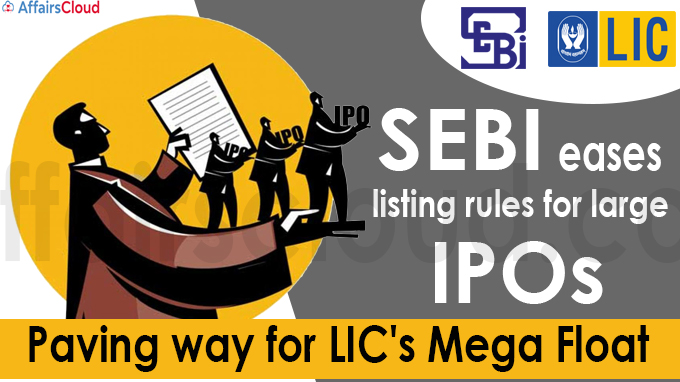
- This move will encourage large firms to opt for listing.
- The meeting was also attended by Union Minister Nirmala Sitharaman, Ministry of Finance and Minister of State (MoS) Anurag Thakur.
Key Points:
i.The minimum public float for large firms with post-issue market capital exceeding Rs 1 trillion is reduced from 10% of post-issue market capital (existing provision) to Rs 10,000 crore. In addition to this, there will be 5% of the incremental amount beyond Rs 1 trillion.
ii.A company with a post-issue market cap of Rs 2 trillion will have to divest a minimum of 7.5%, instead of 10%.
iii.Under the new norms, the large companies are required to achieve at least 10% public shareholding in two years and at least 25% public shareholding within five years from the date of listing
iv.The Union Budget 2021-22 proposed a setting up of a gold spot exchange, the introduction of a unified securities markets code, and an investor charter.
It should be noted that this move will provide flexibility to the government for the mega float of Life Insurance Corporation (LIC) because as per earlier norms LIC would have been required to divest at least 10% at one go. Now, the minimum divest is 5%.
Decision Taken on SEBI Board Meeting
During the SEBI board meeting along with Finance Minister Nirmala Sitharaman,the following implements had been taken
i.The Board approved amendments to SEBI (Portfolio Managers) Regulations, 2020 (PMS Regulations), SEBI (Investment Advisers) Regulations, 2013 and SEBI (Research Analysts) Regulations, 2014.
ii. Repeal of the SEBI (Underwriters) Regulations, 1993 and amendments to the SEBI (Merchant Bankers) Regulations, 1992 and the SEBI (Stock Brokers) Regulations, 1992.
iii. Merger of SEBI (Regulatory Fee on Stock Exchanges) Regulations, 2006 with Securities Contracts (Regulation) (Stock Exchanges and Clearing Corporations) Regulations, 2018.
What is an Initial public offering (IPO)?
The process by which a private company can go public by sale of its stocks to the general public with Minimum Public Offering(MPO).
Recent Related News:
i.The Union Cabinet has also approved the proposal of Securities & Exchange Board of India (SEBI) to sign a bilateral Memorandum of Understanding (MOU) between SEBI and Financial and Commission de Surveillance du Secteur Financier (CSSF), Luxembourg to strengthen cross border cooperation in the area of securities regulations and facilitate mutual assistance.
ii.SEBI has set up a specialised department Corporation Finance Investigation Department (CFID) to tackle initial public offering (IPO) proceed fraud, diversion of funds, bank loans and resources by company promoters.
About Securities and Exchange Board of India (SEBI):
Establishment– 1992
Chairman– Ajay Tyagi
Headquarter– Mumbai, Maharashtra